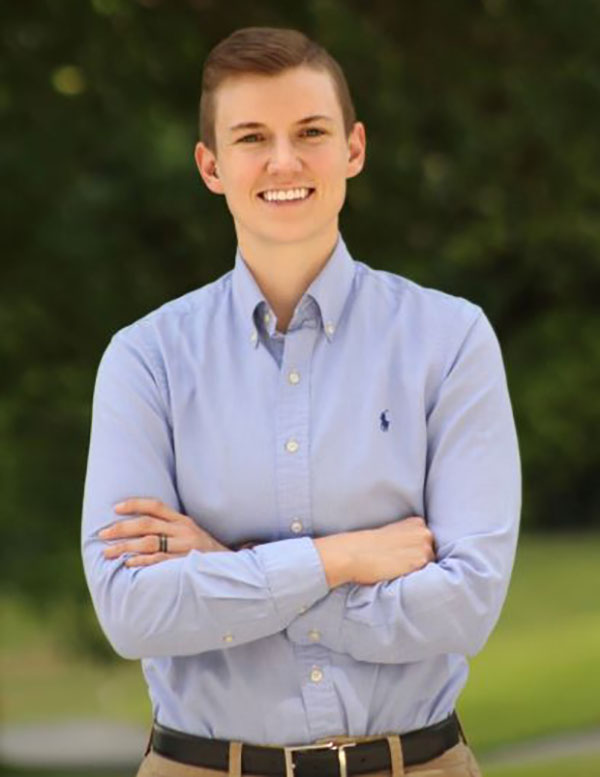BOONE, N.C. — Jess Eatman ’13 transferred to Appalachian State University from Virginia Tech University as a mathematics major, but a General Education sociology class changed the course of her career.
“I had never liked any liberal arts type courses. I am a true ‘left-brained,’ mathematically inclined individual,” Eatman said. “However, I found myself really engaged in the discussions and actually looking forward to class! I had never been into social issues or politics, and I had no experience with analysis outside of a traditional, mathematics setting. I was so fascinated with this scientific approach toward society that I decided to make it a second major.”
Eatman graduated from Appalachian in 2013 with Bachelor of Science degrees in mathematics and sociology, with a concentration in applied research methods.
After graduating, she considered graduate school but opted instead to join the workforce. She combined her two degrees and is now an analytics manager for a team of report developers at McKesson, a health care company based in Richmond, Virginia.
She manages analysts whose primary purpose is to find margin opportunities in the organization. Her team builds self-service tools using big data and visualization applications that allow sales representatives of various departments to deep dive into their bottom line.
Eatman believes her sociology degree has been immensely helpful in the for-profit world.
“Sociology has helped me the most with interpersonal relationships, both personal and professional,” she said. “For example, if I disagree with someone, I can take a step back and take into consideration the other person’s point of view. I can think about what experiences in their lives have led them to feel this way. What were they taught growing up? Who were their examples in life? How different have our paths been leading up to whatever conversation we are having?”
She also suggested sociology gave her the tools to manage her views and expectations.
“For such a long time I was dead set on my opinion being right, and anyone who disagreed was wrong and I had a list of facts to throw their way to prove it. I don’t see the world so black and white anymore because of sociology and my experiences since graduation. There is a large gray area where you are neither right nor wrong, just different. I feel like this critical way of thinking and reflecting came from my foundation in sociology,” she said.
Eatman continued, “Sociology gave me a way to think through various situations critically and take into consideration the social climate in the corporate world in regard to gender, race, sexual orientation and how there is a palpable difference in the way individuals are treated. This perspective began with my sociology courses.”
At Appalachian, Eatman worked closely with Dr. Beth Davison, a professor in the Department of Sociology and co-director of Documentary Film Services in University College. Eatman’s research projects focused on a variety of social issues, including gender discrimination, same-sex marriage and the political climate in North Carolina during the U.S. constitutional fight for same-sex marriage. This research led to an informative research publication titled “An Ecological Examination of North Carolina Amendment One Vote to Ban Same-Sex Marriage” published by Sociation Today.
Beyond her 9-to-5 day, Eatman has kept her passions for sociology and teaching alive through community service. She is a part-time math tutor for children and has volunteered with various nonprofits on projects related to gender identity expression, including Discovering Gender, a nonprofit visual storytelling project.
What do you think?
Share your feedback on this story.
About the Department of Sociology
The Department of Sociology offers a Bachelor of Arts and seven Bachelor of Science concentrations (applied research methods; criminology; families and intimate relationships; health and aging; power and social change; social inequalities; and individually designed, which requires departmental approval). The department also offers minors in sociology and health and aging, plus two online graduate certificates: aging, health and society, and sociology. Learn more at https://soc.appstate.edu.
About the Department of Mathematical Sciences
The Department of Mathematical Sciences offers undergraduate degrees in actuarial science and mathematics, with concentrations in business, computation, life sciences, physical sciences, secondary teaching and statistics, plus a general, self-designed concentration. The department also offers the Master of Arts in mathematics, with concentrations in college teaching and secondary teaching. Learn more at https://mathsci.appstate.edu.
About the College of Arts and Sciences
The College of Arts and Sciences (CAS) at Appalachian State University is home to 17 academic departments, two centers and one residential college. These units span the humanities and the social, mathematical and natural sciences. CAS aims to develop a distinctive identity built upon our university's strengths, traditions and locations. The college’s values lie not only in service to the university and local community, but through inspiring, training, educating and sustaining the development of its students as global citizens. More than 6,800 student majors are enrolled in the college. As the college is also largely responsible for implementing App State’s general education curriculum, it is heavily involved in the education of all students at the university, including those pursuing majors in other colleges. Learn more at https://cas.appstate.edu.
About Appalachian State University
As a premier public institution, Appalachian State University prepares students to lead purposeful lives. App State is one of 17 campuses in the University of North Carolina System, with a national reputation for innovative teaching and opening access to a high-quality, cost-effective education. The university enrolls more than 21,000 students, has a low student-to-faculty ratio and offers more than 150 undergraduate and 80 graduate majors at its Boone and Hickory campuses and through App State Online. Learn more at https://www.appstate.edu.




![How NCInnovation Is Rethinking Economic Development in North Carolina [faculty featured]](/_images/_posts/2026/02/rethinking-economic-development-600x400.jpg)







